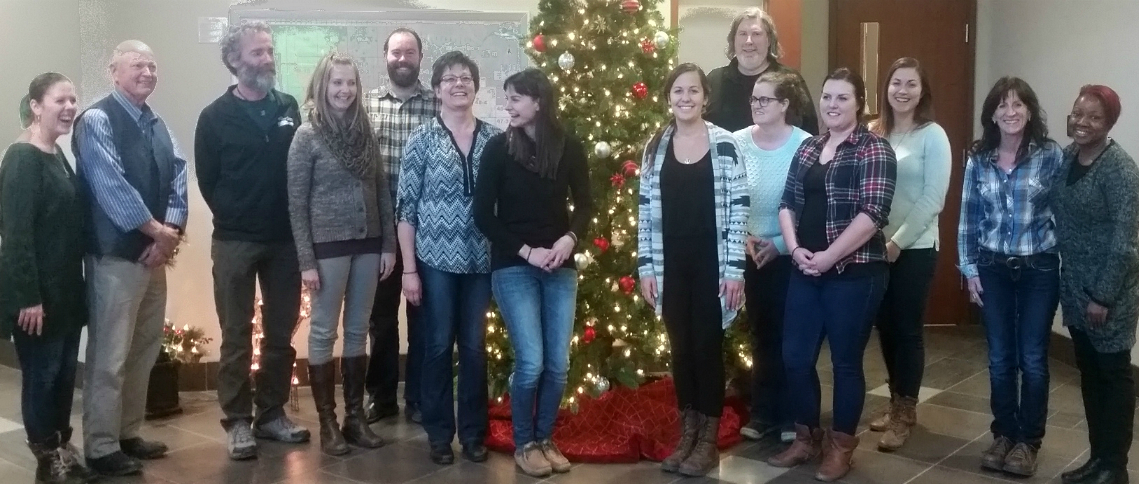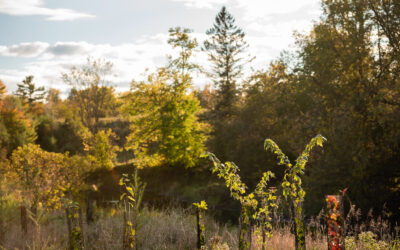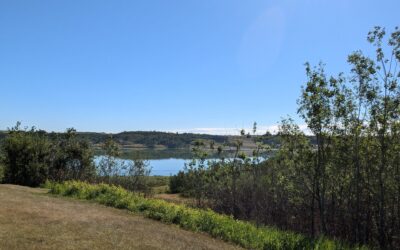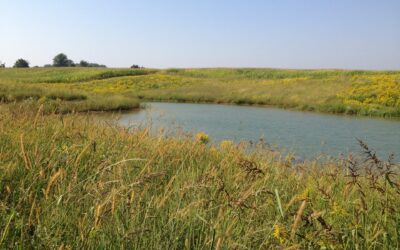Ten Alberta ALUS communities put their heads together at ALUS Canada’s Western Hub Field Conference 2017.
By Christine Campbell, ALUS Canada’s Western Hub Manager
Every year, ALUS Canada brings together Alberta’s ALUS Program Coordinators for the Western Hub Field Conference. In December 2017, ALUS Canada staff from three provinces and representatives of all ten Alberta ALUS communities assembled in Brazeau County to celebrate highlights and find solutions to challenges experienced over the last year.
We exchanged ideas, shared best practices, and streamlined important processes, but it was the passion and enthusiasm brought by each ALUS Coordinator that most marked the conference.

ALUS Program Coordinators from across Alberta brought their passion and enthusiasm to Brazeau County for the annual ALUS Canada Western Hub Field Conference in December 2017. On the nice list, from left to right: Christine Campbell (ALUS Canada Western Hub Manager), Howie Bjorge (ALUS Canada Agrologist), Ken Lewis (ALUS Red Deer County), Lorelee Grattidge (ALUS Mountain View), Benjamin Misener (ALUS Brazeau), Kim Barkwell (ALUS Wetaskiwin-Leduc), Kelsey Fenton (ALUS Flagstaff), Megan Casey, ALUS Lac Ste. Anne), Chris Elder (ALUS Vermilion River), Casey Whitelock (ALUS Canada Eastern Hub Manager), Jalene Makus (ALUS Lacombe), Krista Quesnel (ALUS Parkland), Becky Devaleriola (ALUS Northern Sunrise), Michelle Primus (ALUS Canada Director of Grants and Funding)
One of the best ways to share new ideas, optimize policies and more effectively produce acres of ecosystem services is to bring the whole ALUS team together. Our Western Hub took full advantage of this opportunity last December with a jam-packed agenda.
Each community shared highlights and challenges from the past year, while ALUS Canada provided insights around strategic planning and a new funding initiative known as New Acre™ Project.
Several communities shared effective strategies for growing the program in their community, such as ALUS Parkland, whose autumn mailout produced an unprecedented response from new ALUS participants.
It was also noted that farmers and ranchers have been coming up with unique and interesting project ideas in 2017. Riparian fencing projects have been popular since the inception of the ALUS program, but there is now increased interest in pollinator habitat, eco-buffers, and beaver-related ALUS projects.
One of the reasons for ALUS’s success in Alberta is our strong relationships with organizations such as Cows and Fish (the Alberta Riparian Habitat Management Society) and AWES (the Agroforestry and Woodlot Extension Society). Partners like these provide invaluable expertise to each local ALUS Partnership Advisory Committee (PAC), including consultation for project design and assistance with project monitoring.
True to the grassroots nature of the ALUS program, several ALUS communities also reported an increase in collaboration on the ground, where neighbouring landowners partner together to establish ALUS projects on adjacent quarters of land, joining forces for a greater overall impact on the local environment.
Given the conference’s timing at year’s end, we also discussed the importance of annual reporting—when each ALUS community provides key project data to ALUS Canada—and worked together to optimize the reporting process.
One of the year’s main challenges is perhaps unique to Alberta, where most ALUS communities are run as partnerships between ALUS Canada and local municipalities. The 2017 elections brought significant changes to municipal councils and Agricultural Service Boards throughout the province, requiring many ALUS Program Coordinators to educate these new members about the program.
Also looking toward the future, we welcomed special guests from an Alberta municipality that is considering launching a new ALUS program in the near future—stay tuned for an official announcement later in 2018.
The highlight was the electricity that happens when this geographically dispersed team gets together. The passion each person feels for the ALUS program was palpable in the room. Everyone left rejuvenated, with a renewed appreciation for their role in producing ecosystem services that benefit Canadian society.



